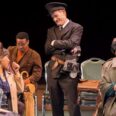
Over some eight hours Monday afternoon and into Monday night, the City Council conducted a wide range of business during a marathon meeting that was bookended by moments of silence in remembrance of people who have died in the COVID-19 pandemic – a number that, on this day, grew to 25 in Pasadena.
The meeting, conducted by teleconference in deference to the “Safer at Home” protocols in place to slow the spread of the coronavirus, began just after 2 p.m. and ended shortly after 10 p.m.
“I ask that we all take a moment to reflect on the extraordinarily difficult circumstances that we are facing as a community today,’’ Mayor Terry Tornek said near the session’s start — asking council members who were scattered in front of computers in their homes, and the handful of city employees spaced around the Council Chambers dais, to remain standing after the Pledge of Allegiance.
“Also,’’ Tornek continued, “that we share the grief and the pain that we have suffered through the death and illness in Pasadena, in our nation and around the world. Please call upon whatever kind of spiritual strength you can summon to comfort and support others and to hope for an early end to this terrible time. Let us share a moment of silence and meditation and prayer.’’
In between that invocation and the second moment of silence that wrapped up the lengthy meeting, council members, among other matters:
- Heard a warning from the city’s health director, Dr. Ying-Ying Goh, that it’s still too early to consider lifting stay-at-home orders.
- Got a detailed synopsis from Finance Director Matthew Hawkesworth on the economic impact the COVID crisis is likely to have on the city’s long-term financial health – with Hawkesworth’s report predicting “significant and prolonged” revenue losses and other fiscal fallout.
- Appropriated some $10 million on a range of routine contracts and purchases that some residents had criticized as postpone-able during the COVID financial crunch.
- Allocated about $85 million for capital improvements in 2021, while also deferring other new capital projects totaling another $8.5 million — money that now stays in the general fund to help the city navigate COVID fallout.
- Approved $210,000 from the general fund to expand meals programs for the city’s vulnerable and at-risk residents.
Medical Update
Goh, saying, “in a community of our size, this international pandemic has rapidly become personal,” detailed the latest COVID statistics: Nationwide, over 720,000 cases and over 37,000 deaths; in California, over 30,000 cases and over 1,100 deaths; in L.A. County, 13,144 cases and 575 deaths; “and in Pasadena, our numbers today are 249 laboratory-confirmed cases and 25 deaths.’’
“All (Pasadena) deaths were related to long-term care facilities, and about 63 percent of our cases are related to long-term care facilities,’’ Goh said.
“The deaths were among individuals 49 years or older. However, we have seen laboratory-confirmed COVID-19 cases among Pasadenans in all age groups, including under 18. About half the cases have been among people age 65 and younger. And people over a wide range of ages have had illness severe enough to require hospitalization. Forty percent of our cases have been hospitalized.’’
Goh stressed it’s too early to consider lifting stay-at-home orders, which first went into effect on March 19. And she said that any such easing of restrictions would have to be done “in coordination with the region and the state.”
“Any lifting of stay-at home measures at this time directly translates to increases in the number of people with COVID-19, and it’s predicted that it could overwhelm our health-care system and likely cause worse health and economic outcomes,’’ she said.
As for the situation at Huntington Hospital, while Goh did not have the most up-to-date numbers regarding patients, she said, “COVID numbers are quite high but they are still able to handle the capacity.’’
The Pasadena Convention Center last week was outfitted to serve as a spillover facility for COVID patients, but has not yet had to be deployed.
Economic Impact
In a memo titled “Long Term Financial Impact of COVID-19 and Financial Market Turmoil, Hawkesworth forecast “significant and prolonged” economic losses in the wake of the coronavirus crisis — though Tornek, in a separate interview with Pasadena Now, said the city is, at least for the short term, appear relatively good shape when it comes to maintaining current levels of service because of sufficient money in reserve funds.
With many businesses shuttered, sales-tax revenues, predictably, have plummeted, pulling the city’s trend lines southward.
Among other negatives, “Transient Occupancy Taxes,” or TOTs, which are paid by hotels, have also nosedived as occupancy has plummeted to between 10 and 15 percent; and the city’s pension obligations to CalPERS will be increasingly strained, as the plan “has realized significant losses over the past month,” the report says.
Hawkesworth’s report projected that total general-fund revenue losses (not just from sales taxes) between Fiscal Year 2020 and Fiscal 2021 (which begins July 1) will be $29.7 million – though the net decrease in Fiscal 2020, by itself, will amount to $7.6 million after “underspending compared to the budget” is factored in.
Meanwhile, revenues losses for Fiscal 2021 are projected at $8.5 million, a number mitigated by postponing various capital improvement projects next fiscal year, the memo says.
Hawkesworth’s numbers also predict only single-digit drops in sales-tax revenues in Fiscal 2021. But Council Member Margaret McAustin, not alone in her skepticism, called those predictions “a little rosy.”
“I think things are going to be worse than you think,’’ she said. “I think we are going to see businesses that never come back.’’
And, she said, “I’m very concerned about the Rose Bowl.’’ She said the facility’s revenue stream figures remain in peril, with big events such as football games, she speculated, unlikely before Jan. 1.
Indeed, as Mermell pointed out, the Rose Bowl has a debt-service payment of around $4 million due in August – which the city would be responsible for if the Rose Bowl cannot make that payment. Any such payment would come from the city’s reserve funds, not the general fund, he said.
“I think we need to expect to pay the Rose Bowl’s debt service,’’ McAustin said. “I hope I’m wrong, but I think (Hawkesworth’s numbers are) a little too optimistic.’’
Meanwhile, with talks about the Fiscal Year 2021 budget starting up, Mermell said that balancing that spending plan might require cuts “through the attrition of vacant positions, perhaps some restructurings here and there,’’ at least initially.
For his part, Tornek told Pasadena Now: “We’re trying to maintain current levels of service, and I think if this (crisis) doesn’t go on for too long, I think that may be possible. So, while it’s not an ideal circumstance, we don’t find ourselves in the sort of desperate straits that some communities will.’’
Capital Improvements
The also council OK’d some $85 million for capital improvements in 2021, most (about $50 million) for projects related to water and power. The money was earmarked for those projects and is not moveable to the general fund for other uses such as mitigating COVID-related crises.
The council, per staff recommendations, also removed about $8.5 million for new projects — money that would have come from the general fund by now will remain in that fund and be more flexible.
Among the projects shelved for another day: Suicide mitigation efforts on the Colorado Street Bridge; some “Americans with Disabilities Act” sidewalk improvements; some pedestrian crossing enhancements; some high-voltage streetlight conversions; and the Union Street cycle track.
‘City’s Operations Need to Continue’
With Mermell saying, “The city’s operations need to continue,’’ the council also approved about $10 million in expenditures for a range of routine matters such as the purchase of four garbage trucks, parking-citation equipment, a janitorial contract, street sweepers and a new camera for the police department’s helicopter.
“The staff and the council members have received correspondence from members of the community questioning some of the purchases that the city is making,’’ Mermell said, defending purchases against critics of “business as usual” at a time when businesses and the city’s renters are crying out for economic help.
“These are all pieces of equipment and services that the city uses day in and day out to provide services to our community,’’ Mermell said.
“Even though we are focused very heavily on the COVID-19 pandemic and our response to it, the city needs to continue to function. We still need to pick up people’s trash, we still need to maintain our streets, our sewer systems, we need to clean our facilities that are in use – in fact, during this time, we have to increase the use of janitorial work to make sure that we’re doing proper disinfecting of areas where employees are working.’’
Mermell added, “I thought it was important to point this out — that the city is an ongoing operation, and we do need these things.’’
In addition, Mermell said that, out of the $10 million allocated, $3 million “would be connected back to the general fund” while the rest comes from funds earmarked for particular areas.
The camera for the police helicopter – with a $420,000 price tag — drew particular scrutiny from council members, but Mermell called it a “routine replacement” matter and said the PD’s current four cameras are aging and cost about $40,000 per year for maintenance. He also said that Police Chief John Perez had budgeted for the expense in the PD’s spending plan.
Council Member Victor Gordo said he was “not sure this is the right time” for such a “tremendous expenditure,” and that he did not want to arrive at a point somewhere in the future where the council would be in position to say, “We should have this money to spend somewhere else.’’
But Council Member Steve Madison called the purchase “fully appropriate,’’ while Council Member Gene Masuda said it was “too important a piece of equipment to delay.’’ Tornek added, “We have to be deferential to the police chief.
The purchase passed by a 6-2 margin, with Gordo and Vice Mayor Tyron Hampton vote “no.”














 0 comments
0 comments


